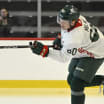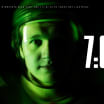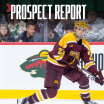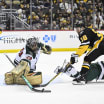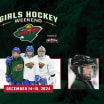ST. PAUL -- With no first- or second-round picks in the upcoming NHL Draft -- at least not yet -- the Minnesota Wild will attempt to uncover some late-round gems.
The 2017 NHL Draft takes place June 23-24 at the United Center in Chicago.
Wild in Search of Late-Round Gems at NHL Draft
Haula, Kuemper, Graovac among Minnesota's quality finds in recent years
Minnesota currently does not have picks in the first two rounds because of previous trades; its first-rounder, pick No. 23, belongs to the Arizona Coyotes as a result of the Martin Hanzal trade last February while its second-rounder was traded to the Buffalo Sabres at the 2015 trade deadline in exchange for Chris Stewart.
But that doesn't mean the Wild won't be on the lookout for elite talent at this year's selection meeting.
For now, Wild Executive Vice President and General Manager Chuck Fletcher and Senior Vice President of Hockey Operations Brent Flahr will go to work with six selections in the upcoming draft, including one pick in the third round (85th overall), two in the fourth (97th, 116th), and one in each the fifth (147th), sixth (178th) and seventh (209th) rounds.
While 14 players on the Wild's current roster were once first-round selections, with three more being picked in the second, Minnesota has players picked from the later rounds that have contributed quality minutes in recent years.
ODarcy Kuemper and Jared Spurgeon were each sixth-round picks. Erik Haula and Tyler Graovac were seventh rounders.
Even in the early years of the franchise, the Wild was able to find players in the later rounds that would eventually make contributions.
Cal Clutterbuck, Stephane Veilleux and Clayton Stoner were third-round picks. Justin Falk was picked in the fourth round.
Derek Boogaard and Anton Khudobin were each seventh-round picks.
"There's been a lot of guys that have been able to play for us and will play for us," Fletcher said. "That's a great sign. Take a look at the two teams in the Stanley Cup Finals and the guys they've been able to find in the mid to late rounds. You have to do that."
Fletcher said the team's research has shown that the baseline for maintaining a middle-of-the-road organization is finding two players in each draft that will play at least 100 games in the NHL.
Teams that don't reach that struggle to reach that benchmark fall behind while many of the League's better teams find a way to exceed that number.
The Detroit Red Wings are considered the modern standard bearer for cultivating late-round talent over the last couple of decades. They missed the playoffs this past season season for the first time in 25 years.
In the past five years, it's been the Nashville Predators that Fletcher said have done a good job hitting on late-round fliers. The result: One of the NHL's deepest teams, and one that reached the Stanley Cup Final for the first time in franchise history.
"The only way to [reach that benchmark] is to hit on at least one later round pick, and that's assuming you hit on your first and second-round picks," Fletcher said. "Sometimes, it's just having extra darts. If you can get a couple extra picks in the later rounds, it obviously increases your chances of finding a player.
Minnesota believes it has picked good late-round talent in recent years, snagging Dmitry Sokolov in the seventh round last season. Sokolov scored 48 goals in 64 games with Sudbury of the Ontario Hockey League last year, then made his professional debut with Iowa late in the season, scoring once in two games with the Wild's AHL affiliate.
Kirill Kaprizov was a fifth-round pick of the Wild in 2015 and is viewed as one of the best prospects in the organization after a breakout performance at the World Junior Championships and a historic season as a 19-year old in the KHL.
The Wild picked defenseman Carson Soucy in the fifth round of the 2013 NHL Draft. He signed his first pro contract this spring after wrapping his collegiate career with the University of Minnesota Duluth. Soucy could challenge for a roster spot this fall at training camp, but at a minimum, will be counted on to play in Iowa.
The same can be said for defenseman Nick Seeler, a fifth rounder in 2011, who played in 57 games with Iowa in his first pro season this year. Fletcher called him the organization's "most improved player."
"I'm confident in our group [of scouts]," Fletcher said. "They've done a nice job in the later rounds. It's certainly not an exact science, it's difficult and you're going to miss certainly more than you're going to hit, but I'm confident this year we'll find a way to get a player or two in the later rounds and create some good value for this franchise going forward."
Fletcher indicated in a draft preview get-together with media on Wednesday that, while the Wild presently has nothing cooking in terms of adding a first- or second-round pick, he's not ruling it out.
Adding more late rounders is always a possibility too. Afterall, stock piling assets -- no matter what there form -- is the priority this time of year.
"That's what it's all about," he said.



